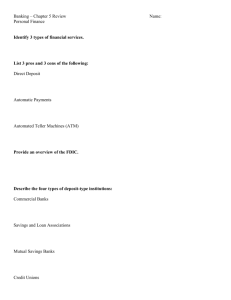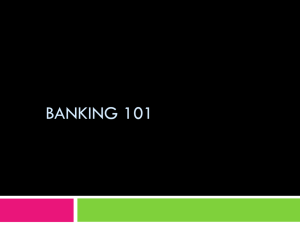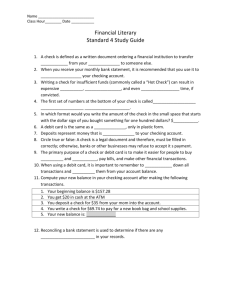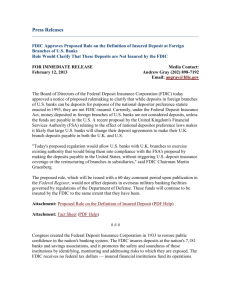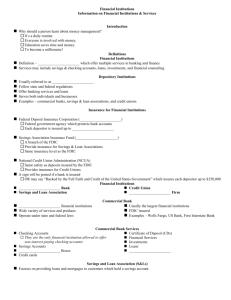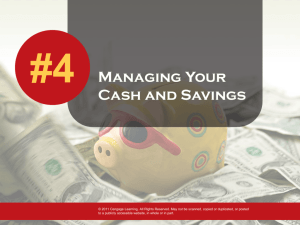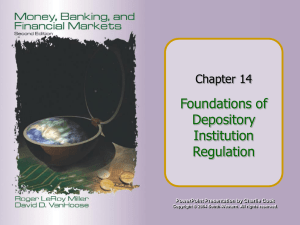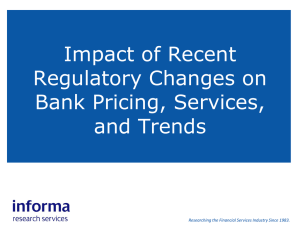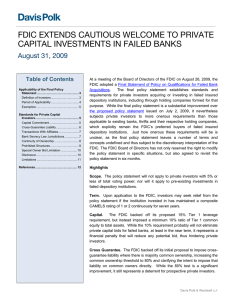Institution Notes
advertisement
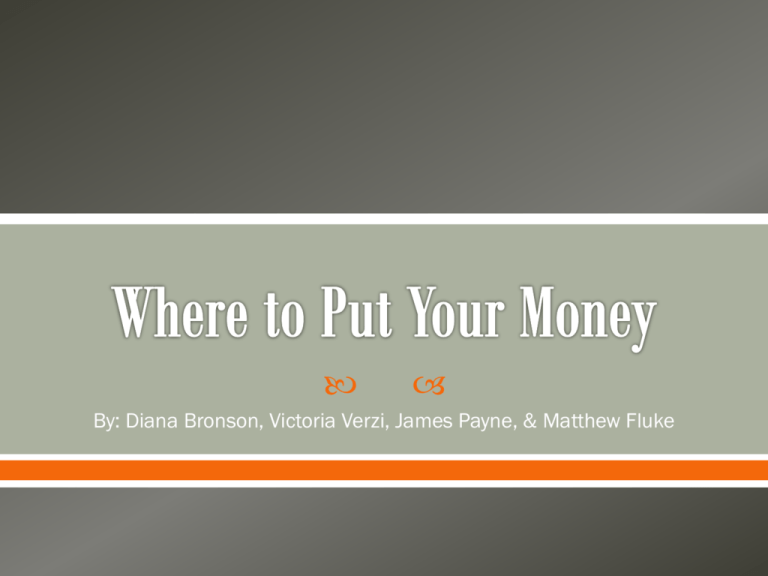
By: Diana Bronson, Victoria Verzi, James Payne, & Matthew Fluke Offer checking and savings accounts and a range of financial products and services Only institution that offers demand accounts (noninterest-paying accounts) Ex. o Bank of America Entirely online commercial banks Used for their convenience, lower service fees, and higher interest on accounts Ex. o Ally Bank o Discover Bank o USAA Gains funds from and lends to community where it operates Ex. o Old Florida National Bank • Boone High School • Ad in the Yearbook, Newspaper, Sports Program, along with merchandise https://www.oldflorida.com/about_us/why_bank_local/ Takes savings from deposits and put it into mortgage loans for it members Also offers checking and saving accounts Not very common in today’s society Nonprofit, member owned institution that provides a full range of financial products and services Provides the highest return because they don’t receive fees like the other institutions (nonprofit) Members belong to common occupation, religious, fraternal order, or residential area. o Central Florida Educators – meant for teachers o McCoy Federal Credit Union – meant for airport employees o Fairwinds – meant for the Navy Many credit unions have opened up to people who live, work, worship, and volunteer in a area or has family who do so. Make sure you stop by the CFE Boone Branch and open an account Only offered at commercial banks Insured up to $250,000 per banking institution by Federal Deposit Insurance Corporation (FDIC) Called a demand deposit o Bank is required to give the money to the depositor whenever they wish to withdrawal it. Normally doesn’t earn interest Minimum balance required Called time deposits o the money that is deposited is expected to remain in the account longer than a checking account Offered at o Commercial Bank o Credit Union o Savings and Loans o Savings Bank Higher interest than checking account Used to accumulate money for future goal or unexpected expense Insured by the FDIC up to $250,000 Negotiable order of withdrawal accounts Checking Accounts that offer interest o Start paying interest at a certain balance All depository institutions are allowed to offer them No legal minimum balance Insured by the FDIC up to $250,000 Use checks and ATM’s to access account o Limited number of free checks & transfers • Not seen as a disadvantage because most think of them as savings Compete with money market mutual funds o More convient o Safer- protected by FDIC Offered at o Banks o Depository institutions Savings instrument that earns interest o People put their money into CDs because • Convienent • Federally insured • Attractive return on money must remain on deposit anywhere between 7 days to 7 or more years Penalty for withdrawing money before maturity date o Normally requires you to forfeit a certain amount of interest Longer time + more money = higher interest Post your question to the Help Desk where one of us can help you http://floridastudentsaves.com/help_desk.aspx Only offered at commercial banks Insured up to $250,000 per banking institution by Federal Deposit Insurance Corporation (FDIC) Called a demand deposit o Bank is required to give the money to the depositor whenever they wish to withdrawal it. Normally doesn’t earn interest Minimum balance required Called time deposits o the money that is deposited is expected to remain in the account longer than a checking account Offered at o Commercial Bank o Credit Union o Savings and Loans o Savings Bank Higher interest than checking account Used to accumulate money for future goal or unexpected expense Negotiable order of withdrawal accounts Checking Accounts that offer interest o Start paying interest at a certain balance All depository institutions are allowed to offer them No legal minimum balance Use checks and ATM’s to access account o Limited number of free checks & transfers • Not seen as a disadvantage because most think of them as savings Compete with money market mutual funds o More convient o Safer- protected by FDIC Offered at o Banks o Depository institutions Savings instrument that earns interest o People put their money into CDs because • Convienent • Federally insured • Attractive return on money must remain on deposit anywhere between 7 days to 7 or more years Penalty for withdrawing money before maturity date o Normally requires you to forfeit a certain amount of interest Longer time + more money = higher interest The key thing to understand is that the rate you get on a particular security or account are all determined by the risk associated with it. Remember: Securities are non-insured investments, which are more risky Risk and Return plays a part in every investment and every place you will put your money. Ever. To a certain extent, yes, it can go away. Let’s give an example: For example, if you put your money into an account with SAVES Co. SAVES Co. will use that money to offer loans to other people to help them by cars or houses, SAVES Co. then charges them more money than you gave to them. That is how banks make their money. But let’s assume the people SAVES Co. has given money to don’t pay them back and they keep giving loans. In that instance the bank would become insolvent or, unable to pay its debts. Your rate will be determined by your access to cash and how likely it is it might go away. The higher the risk with an investment, the more money you’ll make. Treasuries are sold by the U.S. government and are used as a standard risk free rate throughout the economy. Treasury securities will play a key role in your financial plan There are three types of Treasury Securities and they are all different periods of time. o T-Bills- T-Bills last less than a year, they pay the lowest interest of all the o o o o three types of securities because they are the least risky T-Notes- T-Notes last between 1-10 years and have a median level of risk T-Bonds- T-Bonds last between 10-30 years, although the 30 year bonds are no longer sold Treasury securities are considered Highly Liquid, or easy to turn back into cash through their sale The longer the period on a Treasury, or any security, the higher your rate will be. Series EE bonds are sold by the U.S. government, much like Treasury Securities Series EE bonds don’t get to be resold to anyone, if your name is on the bond it’s yours. Series EE bonds can be redeemed after just one year of owning one, however you can keep them up to 20 years, all the while gaining interest! EE bonds are ultra safe, they have almost no risk, like Treasuries.
